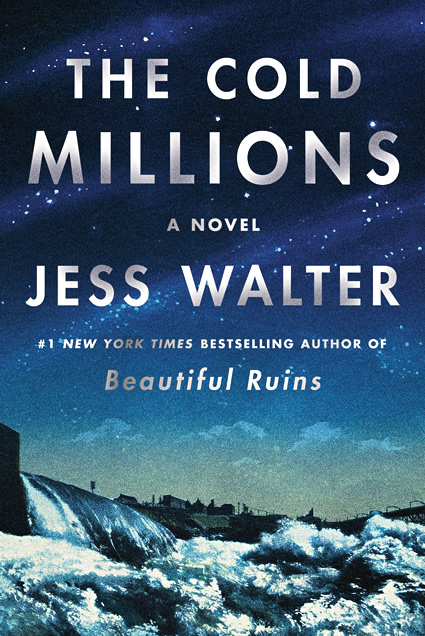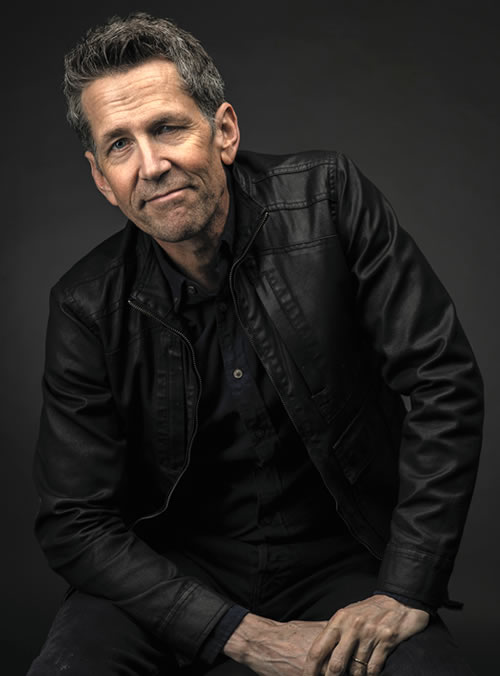The Cold Millions

Overview
The Cold Millions by Jess Walter is a critically acclaimed, nationally bestselling novel set in Spokane, Washington, about two brothers who are swept into the turbulent class warfare of the early 20th century. An intimate story of love, sacrifice, and betrayal set against the dawn of the labor movement, this “vivid, propulsive” novel (USA Today) offers a vibrant portrait of a nation grappling with the chasm between rich and poor, the vulnerable and the powerful. Walter weaves fiction and history into “...a work of irresistible characters, harrowing adventures, and rip-roaring fun” (Washington Post). “It’s often said that a novel contains the world; Walter brings new meaning to this phrase, peopling The Cold Millions with vaudeville stars, hobos, suffragists, tycoons, union agitators, policemen, and dozens of other vibrant characters. Warm and deeply humane, this transporting novel is a staggering achievement” (Esquire).
“It’s quite a thing when the world is upside down to hear someone say it don’t have to be….” — The Cold Millions
Before he wrote The Cold Millions, Jess Walter had always wanted to tell a story about the dawn of the 20th century in Spokane, Washington. In the early 1900s, the city was the artery for seven major railways, bringing hundreds of people to the city’s doorstep each day. As a child, Walter grew up listening to his grandfather tell stories about train-hopping: “...for a kid who grew up with Treasure Island, it sounded like stowing away on a pirate ship,” Walter remembered. “I wanted to be able to write with that sense of adventure that I remembered [from] those stories, and to make us think about homelessness and poverty in different ways, you know, the way maybe they were thought about 110 years ago” (NPR). It is that desire that animates The Cold Millions: a sweeping story about brotherhood and love, greed and hope, the dignity of work and the rise of the modern labor movement.
The last surviving members of their family, brothers Rye and Gig Dolan land in Spokane after spending a year moving “job to job, week to week, farm to farm, Washington to Oregon to Idaho” (p. 16). In the city, they dodge the grasping hands of the law and exploitative job agencies, making just enough between them to rent an enclosed porch in Little Italy and get the occasional 50-cent seat to see the vaudeville singer Ursula the Great perform, caged with a live cougar. A pensive, steady 16-year-old, Rye yearns for just two things: a reliable job and a home. His brother, Gig, on the other hand, spends his days reading worn volumes of War and Peace and agitating for workers’ rights with the Industrial Workers of the World (IWW).
When Rye follows his brother to a free speech protest led by the IWW, they are both arrested alongside other union organizers. Rye finds himself freed from jail and meets the “redoubtable, estimable, formidable” (p. 79) Elizabeth Gurley Flynn, a 19-year-old firebrand from New York—and a real historical figure—working to organize union actions across the West. Flynn sees Rye’s story as a chance to establish a face for the IWW’s fight, and launches him on a whirlwind tour of workers’ halls across Washington. In doing so, she propels him headfirst into the movement that Gig loved, even as Rye wonders what lengths he’d go, and who he’d betray, to save his brother.
Walter has described the novel as a “last-gasp Western” (BookPage): a mythic period of America captured, not in full luster, but in the fading glory of its last wild days. Cohering history with fiction, he renders tropes of the genre in meticulous detail while giving characters a chance to tell their own story: the venal sheriff, the beautiful woman with a hidden past, the jaded killer, the villain and hero caught in a standoff, the stranger who walks into town. In one chapter, the killer chafes against the ceaseless call of “the job.” In another, the sheriff forgives the man who shot him, “...prayed for his soul and mine, sorry we’d been born into such a place” (p. 317). Across the pages of The Cold Millions, Walter introduces villains who kill and save, heroes who sacrifice and betray, women who soothe and incite, families that are made and remade. “No one wins the war,” Flynn tells Rye just before she returns to New York. “Not really. I mean, we’re all going to die, right? But to win a battle now and then? What more could you want?” (p. 336).
- In the first lines of Part One of The Cold Millions, Rye and Gig Dolan are introduced among many seasonal workers camping on an abandoned ballfield near the Spokane River, “...its infield littered with itinerants, vagrants, floaters, Americans” (p. 9). Why do you think Walter chose to include “Americans” in this list? What does being an “American” mean in this novel? To these characters? To you?
- Throughout the novel, itinerant workers are a driving force within the labor movement. What stereotypes or narratives are projected onto these workers? Do you think stereotypes or narratives are still projected onto itinerant workers today? If not, why not? If so, in what ways and by whom?
- Gig describes Spokane as “the Last Rush Town” and to Rye, Spokane feels like “the intersection of Frontier and Civilized, the final gasp of a thing before it turned into something else” (p. 27). In what ways do the novel’s characters reflect–or change as a result of—the novel’s setting? Could you imagine the characters, or this story, taking place elsewhere in the country? Why or why not?
- When Rye asks Jules for his thoughts on unions, Jules tells a story with a maxim at its center: “One man to a boat…We all go over alone” (p. 27). As Rye gets breakfast later in the IWW Hall, he looks around the room “...at his brother, at Jules, at Walsh and Little, at the porter Everett and the ranch hands, at a half dozen others in threadbare clothes and whiskered faces, this army of the poor and broken, in it together now, but alone, too, each man moving toward the horizon of his own end” (p. 33). Are there other moments in the book where you see this tension between the collective and the individual?
- Early Reston makes a case “...for making bombs instead of speeches” (p. 44) as the only feasible path forward in class warfare. Where do other characters fall in this debate? Does this change over the course of the novel?
- As Jules drifts in and out of consciousness in the city jails, he remembers the colonization of Salish lands by industrialists: “On the ground, they drove all the game away with hammering and sawing, they cleared the hillsides of berries to build more houses—they killed the world and called it progress” (p. 72). How might different characters define progress throughout the novel? Can you think of other times—in history, in other stories, in your own life—where different definitions of progress have led to conflict?
- Gemma says of Jules: “I think he came to believe it was better to choose your life, and that even choosing your death was better than letting someone else choose your life” (p. 91). How is this reflected in the choices that Jules has made in his own life? Did the revelation of his true relationship to Gemma come as a surprise to you?
- Throughout The Cold Millions, Walter shifts perspectives, giving voice to a variety of characters. What did you make of these choices? How do you think you would have responded to the novel if the story was told from just one character, or by an omniscient narrator? If the story was told in just one character’s voice, whose would you want it to be?
- The novel's two main female characters—Elizabeth Gurley Flynn and Ursula the Great—each receive a fair amount of time on the page before they get to speak for themselves. When they do tell their stories, do they change the perception you've formed of them from others' narratives?
- The story of First Ursula's creation of her persona echoes Gemma's observation, "What was life if not one invention after another?" (p. 96), as well as Del Dalveaux’s statement that when Lee Brand hired him, he “...was hiring a story” (p. 155). How does this relate to the other characters in the novel?
- Rye has his epiphany about the book’s title—the “cold millions” (p. 105)—in Lem Brand's library; a few worn copies of War and Peace are Gig’s most treasured possessions. Near the end of the book, Rye has begun to read Tolstoy and finds himself wishing he could talk to his brother about it until he remembers “...Gig hadn’t read that far into War and Peace. Only he had done that” (p. 303). What role do books and literature play in the novel? Who had access to literature then? Who has access to it now?
- When Brand tells Rye that he wouldn’t ask him to “do anything that goes against your ethics” (p. 107), Rye wonders at the question: “Ethics? Did Rye have those?....He wondered just what sort of ethics a person needed to survive so long in cages with cougars” (p. 107-109). How do Rye’s ethics change over the course of the book? What about the ethics of other characters? What forces shape those changes?
- On the train to Missoula, Early tells Rye that “Everyone does everything for a little bit of money…you and your brother got yourselves arrested over what? A dollar!” (p. 176). Rye responds that it was not about the dollar, but about free speech: the difference between “…arguing for basic pay versus a guy taking money to sell out the people he’s helping” (p. 178). What role does speech play in the conflicts that take place throughout the book? Are there any moments where speech is particularly powerful? Where the power of speech is weakened?
- The main action in the book takes place during the free speech riots of 1909 and 1910; of the years that follow, Rye wonders “if the whole world wasn’t collapsing. The news was all famine and influenza, murder and war, every day some fresh horror” (p. 325). How do you view Rye’s concerns now that we have the benefit of hindsight? Do you see any parallels to current events, and/or current concerns about those events? Do these concerns feel similar or different in certain ways than Rye’s concerns?
- Through what means, besides money, did characters in The Cold Millions try to wield power? To what end? Were they successful?
- Near the end of the book, Walter writes that “...Rye thought that history was like a parade. When you were inside it, nothing else mattered. You could hardly believe the noise—the marching and juggling and playing of horns. But most people were not in the parade. They experienced it from the sidewalk, from the street, watched it pass, and when it was on to the next place, they had nothing to do but go back to their quiet lives” (p. 304). What historical events have you witnessed throughout your own life? Did you feel like you were “in the parade” or “on the sidewalk”? How might your perspective of an event have shifted if you were “inside” it? If you were watching it pass?
- In the afterword of the book, Walter notes that The Cold Millions is “...a fictionalized story [set] among real historical figures and events” (p. 339). How do fiction and history interact within the book? Did it change your reading of the book to know that certain characters were real historical figures? Did you learn something new about these historical figures?
Source material for The Cold Millions discussion questions from HarperCollins


